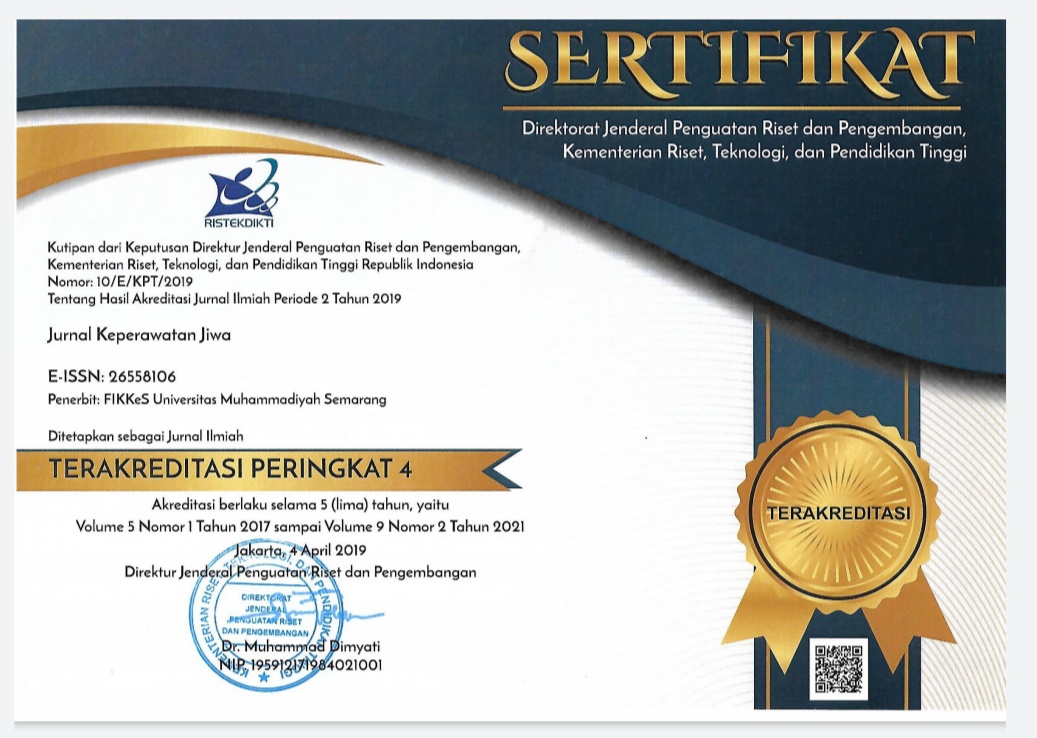Depression among Community Middle Adulthood Age Groups
(1) STIKes Santo Borromeus
(2) STIKes Santo Borromeus
(3) STIKes Santo Borromeus
(*) Corresponding Author
Abstract
The second peak in the incidence of depression occurs in the middle adulthood age groups. Depression has a more chronic course and poorer prognosis in older adults than in younger and the effect caused impaired well-being. Research on depression in the middle adult group has not been widely carried out and is mostly done in early adulthood and elderly groups Purpose of the research to identify the level of depression in the middle adulthood age groups.Research method using quantitative research with a descriptive design. The research instrument used depression inventory from Beck Depression Inventory (BDI-II). The sample was selected using a total sampling technique, amounting to 170 respondents. The results showed respondents were studied, 48.8% are men and 51.2% are women. There are 20% of respondents at the level of mild depression, 56.5% of respondents at the level of moderate depression and 4.7% of respondents at the level of major depression. The research results can become basic data that can be developed for mental health services in the community at the primary health level.
Keywords
Full Text:
PDFReferences
Al-Maharbi, S., Abolkhair, A. B., Al Ghamdi, H., Haddara, M., Tolba, Y., El Kabbani, A., Al Sadoun, A., Pangilinan, E., Joy, J., Khait, S. A., & Al-Khudhairy, M. W. (2018). Prevalence of depression and its association with sociodemographic factors in patients with chronic pain: A cross-sectional study in a tertiary care hospital in Saudi Arabia. Saudi journal of anaesthesia, 12(3), 419–425. https://doi.org/10.4103/sja.SJA_771_17
De Miranda Azevedo, R., Roest, A. M., Carney, R. M., Denollet, J., Freedland, K. E., Grace, S. L., Hosseini, S. H., Lane, D. A., Parakh, K., Pilote, L., & de Jonge, P. (2016). A bifactor model of the Beck Depression Inventory and its association with medical prognosis after myocardial infarction. Health psychology : official journal of the Division of Health Psychology, American Psychological Association, 35(6), 614–624. https://doi.org/10.1037/hea0000316
English, I., & Campbell, D. G. (2019). Prevalence and characteristics of universal depression screening in U.S. college health centers. Families, systems & health : the journal of collaborative family healthcare, 37(2), 131–149. https://doi.org/10.1037/fsh0000411
Estabrook, R., Sadler, M. E., & McGue, M. (2015). Differential item functioning in the cambridge mental disorders in the elderly (CAMDEX) depression scale across middle age and late life. Psychological Assessment, 27(4), 1219-1233. doi:http://dx.doi.org/10.1037/pas0000114
Galambos, N. L., Johnson, M. D., & Krahn, H. J. (2018). The anger–depression connection: Between-persons and within-person associations from late adolescence to midlife. Developmental Psychology, 54(10), 1940-1953. doi:http://dx.doi.org/10.1037/dev0000568
Infurna, F. J., Gerstorf, D., & Lachman, M. E. (2020). Midlife in the 2020s: Opportunities and challenges. American Psychologist, 75(4), 470-485. doi:http://dx.doi.org/10.1037/amp0000591
Kim, J. S., & Kang, S. (2015). A study on body image, sexual quality of life, depression, and quality of life in middle-aged adults. Asian Nursing Research, 9(2), 96-103. doi:http://dx.doi.org/10.1016/j.anr.2014.12.001.
Lopez, V., Sanchez, K., Killian, M. O., & Eghaneyan, B. H. (2018). Depression screening and education: an examination of mental health literacy and stigma in a sample of Hispanic women. BMC public health, 18(1), 646. https://doi.org/10.1186/s12889-018-5516-4
Maher, G. M., Perry, C. P., Perry, I. J., & Harrington, J. M. (2016). Protective lifestyle behaviours and depression in middle-aged irish men and women: A secondary analysis. Public Health Nutrition, 19(16), 2999-3006. doi:http://dx.doi.org/10.1017/S1368980016001105
Maurer, D. M., Raymond, T. J., & Davis, B. N. (2018). Depression: Screening and Diagnosis. American family physician, 98(8), 508–515.
Nanthakumar, S., Bucks, R. S., & Skinner, T. C. (2016). Are we overestimating the prevalence of depression in chronic illness using questionnaires? meta-analytic evidence in obstructive sleep apnoea. Health Psychology, 35(5), 423-432. doi:http://dx.doi.org/10.1037/hea0000280
Owens, M., Watkins, E., Bot, M., Brouwer, I.A., Roca, M., Kohls, E., Penninx, B.W.J.H., van Grootheest, G., Hegerl, U., Gili, M., & Visser, M.(2020). Nutrition and depression: Summary of findings from the EU‐funded MooDFOOD depression prevention randomised controlled trial and a critical review of the literature. Nutr. Bull.. doi:10.1111/nbu.12447
Park, L. T., & Zarate, C. A., Jr (2019). Depression in the Primary Care Setting. The New England journal of medicine, 380(6), 559–568. https://doi.org/10.1056/NEJMcp1712493
Qiao, Y‐M., Lu, Y‐K., Yan, Z., Yao, W., Pei, J‐J., & Wang, H‐X.(2019). Reciprocal associations between job strain and depression: A 2‐year follow‐up study from the Survey of Health, Ageing and Retirement in Europe. Brain Behav.; 9:e01381. https://doi.org/10.1002/brb3.1381
Sang-Wook, Y., & Jae-Seok, H. (2015). Depressive symptoms and other risk factors predicting suicide in middle-aged men: A prospective cohort study among korean vietnam war veterans. PeerJ, doi:http://dx.doi.org/10.7717/peerj.1071
Steiger, A. E., Fend, H. A., & Allemand, M. (2015). Testing the vulnerability and scar models of self-esteem and depressive symptoms from adolescence to middle adulthood and across generations. Developmental Psychology, 51(2), 236-247. doi:http://dx.doi.org/10.1037/a0038478
Weinberger, A. H., Gbedemah, M., Martinez, A. M., Nash, D., Galea, S., & Goodwin, R. D. (2018). Trends in depression prevalence in the USA from 2005 to 2015: Widening disparities in vulnerable groups. Psychological Medicine, 48(8), 1308-1315. doi:http://dx.doi.org/10.1017/S0033291717002781
Article Metrics
Abstract view : 578 timesPDF - 56 times
DOI: https://doi.org/10.26714/jkj.9.2.2021.357-362
Refbacks
- There are currently no refbacks.

This work is licensed under a Creative Commons Attribution 4.0 International License.
PPNI Univ. Muhammadiyah Semarang
Jl. Kedungmundu Raya No. 18 Semarang Gedung NRC University of Muhammadiyah Semarang
Phone: 02476740287
Fax: 02476740287
Email: [email protected]
This work is licensed under a Creative Commons Attribution 4.0 International License.


